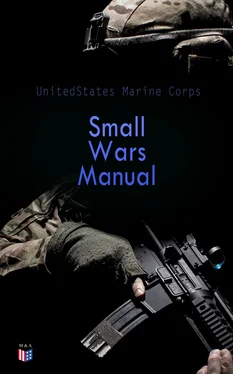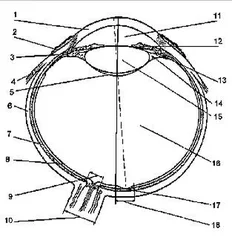(2) During the. initial phase small numbers of troops may be sent ashore to assume the initiative, as a demonstration to indicate a determination to control the situation, and to prepare the way for any troops to follow. This vanguard is generally composed of marine detachments or mixed forces of marines and sailors from ships at the critical points. Owing to its limited personnel the action of the vanguard will often be restricted to an active defense after seizing a critical area such as an important seaport or other city, the capital of a country or disturbed areas of limited extent.
c. Second phase.—The arrival of reenforcements and general military operations in the field.
During this period the theater of operations is divided into areas and forces are assigned for each. Such forces should be sufficiently strong to seize and hold the most important city in the area assigned and to be able to send combat patrols in all directions. If certain neutral zones have not been designated in the first phase, it may be done at this time if deemed advisable. During this phase the organization of a native military and police force is undertaken. In order to release ships’ personnel to their normal functions afloat, such personnel are returned to their ships as soon as they can be relieved by troops of the expeditionary force.
d. Third phase.—Assumption of control of executive agencies, and cooperation with the legislative and judicial agencies.
If the measures in phase 2 do not bring decisive results, it may be necessary to resort to more thorough measures. This may involve the establishment of military government or martial law in varying degree from minor authority to complete control of the principal agencies of the native government; it will involve the further strengthening of our forces by reenforcements. More detachments will be sent out to take other important localities; more active and thorough patrolling will be undertaken; measures will be taken to intercept the vital supply and support channels of the opposing factions and to break the resistance to law and order by a combination of effort of physical and moral means. During this period the marines carry the burden of most of the patrolling. Native troops, supported by marines, are increasingly employed as early as practicable in order that these native agencies may assume their proper responsibility for restoring law and order in their own country as an agency of their government.
e. Fourth phase.—Routine police functions. (1) After continued pressure of the measures in phase three, it is presumed that sooner or later regular forces will subdue the lawless elements. Military police functions and judicial authority, to the extent that they have been assumed by our military forces, are gradually returned to the native agencies to which they properly belong.
(2) Our military forces must not assume any judicial responsibility over local inhabitants beyond that expressly provided by proper authority. The judicial powers of commanders of detached posts must be clearly defined in orders from superior authority. Furthermore, as long as the judicial authority rests squarely upon the shoulders of the civil authorities, the military forces should continually impress and indoctrinate them with their responsibility while educating the people in this respect. Each situation presents certain characteristics peculiar to itself; in one instance officers were clothed with almost unlimited military authority within the law and our treaty rights; in another, less authority was exercised over the population; and in the third instance the forces of occupation had absolutely no judicial authority. The absence of such authority is often a decided handicap to forces of occupation in the discharge of their responsibilities. If the local judicial system is weak, or broken down entirely, it is better to endow the military authorities with temporary and legal judicial powers in order to avoid embarrassing situations which may result from illegal assumption.
(3) During this phase the marines act as a reserve in support of the native forces and are actively employed only in grave emergencies. The marines are successively withdrawn to the larger centers, thus affording a better means for caring for the health, comfort, and recreation of the command.
f. Fifth phase .—Withdrawal from the theater of operations. Finally, when order is restored, or when the responsible native agencies are prepared to handle the situation without other support, the troops are withdrawn upon orders from higher authority. This process is progressive from the back country or interior outward, in the reverse order to the entry into the country. After evacuation of the forces of intervention, a Legation Guard, which assumes the usual functions of such a detachment, may be left in the capital.
Table of Contents
a. Since the World War there has been a flood of literature dealing with the old principles illustrated and the new technique developed in that war: but there always have been and ever will be other wars of an altogether different kind, undertaken in very different theaters of operations and requiring entirely different methods from those of the World War. Such are the small wars which are described in this manual.
b. There is a sad lack of authoritative texts on the methods employed in small wars. However, there is probably no military organization of the size of the U. S. Marine Corps in the world which has had as much practical experience in this kind of combat. This experience has been gained almost entirely in small wars against poorly organized and equipped native irregulars. With all the practical advantages we enjoyed in those wars, that experience must not lead to an underestimate of the modern irregular, supplied with modem arms and equipment. If marines have become accustomed to easy victories over irregulars in the past, they must now prepare themselves for the increased effort which will be necessary to insure victory in the future. The future opponent may be as well armed as they are; he will be able to concentrate a numerical superiority against isolated detachments at the time and place he chooses; as in the past he will have a thorough knowledge of the trails, the country, and the inhabitants; and he will have the inherent ability to withstand all the natural obstacles, such as climate and disease, to a greater extent than a white man. All these natural advantages, combining primitive cunning and modern armament, will weigh heavily in the balance against the advantage of the marine forces in organization, equipment, intelligence, and discipline, if a careless audacity is permitted to warp good judgment.
c. Although small wars present a special problem requiring particular tactical and technical measures, the immutable principles of war remain the basis of these operations and require the greatest ingenuity in their application. As a regular war never takes exactly the form of any of its predecessors, so, even to a greater degree is each small war somewhat different from anything which has preceded it. One must ever be on guard to prevent his views becoming fixed as to procedure or methods. Small wars demand the highest type of leader* ship directed by intelligence, resourcefulness, and ingenuity. Small wars are conceived in uncertainty, are conducted often with precarious responsibility and doubtful authority, under indeterminate orders lacking specific instructions.
d. Formulation of foreign policy in our form of government is not a function of the military. Relations of the United States with foreign states are controlled by the executive and legislative branches of the Government. These policies are of course binding upon the forces of intervention, and in the absence of more specific instructions, the commander in the field looks to them for guidance. For this reason all officers should familiarize themselves with current policies. A knowledge of the history of interventions, and the displays of force and other measures short of war employed by our Government in the past, are essential to thorough comprehension of our relations with foreign states insofar as these matters are concerned.
Читать дальше












